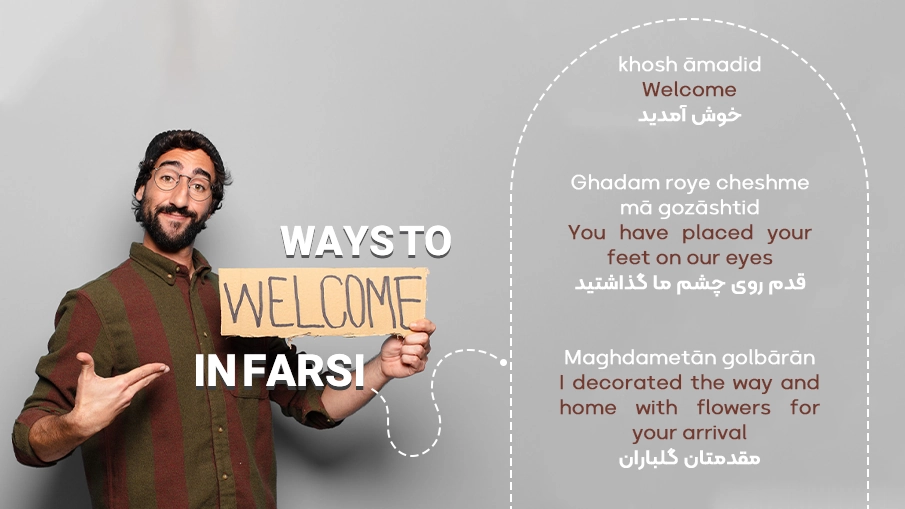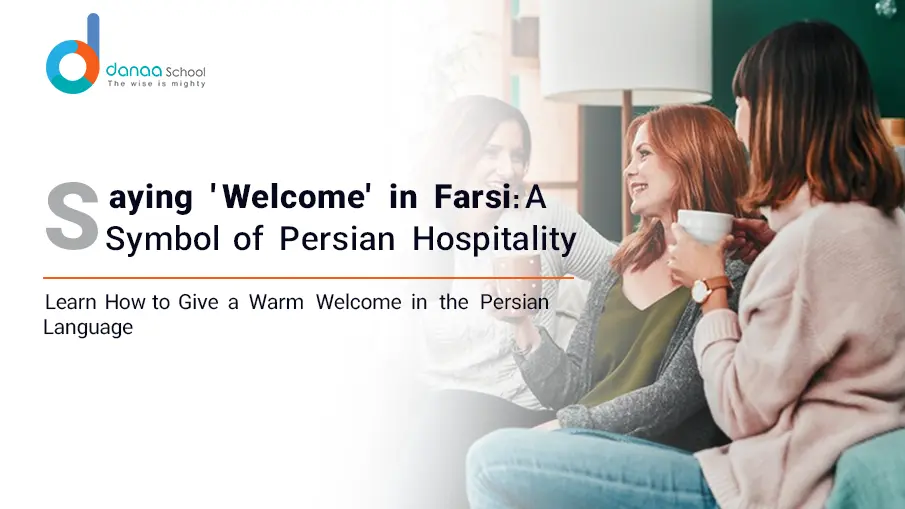When you say welcome in Farsi—“khosh āmadid”—you aren’t merely using a polite phrase. You are, in essence, embracing a visitor with the warmth and hospitality that defines Persian culture. This greeting goes beyond words; it embodies centuries of Iranian tradition, where every guest is treated with the highest respect, care, and attention. In this article, we will explore the significance of “khosh āmadid,” how to pronounce it, and the deeper meaning it holds in Persian society.
Pronouncing “Welcome” in Farsi
The phrase “khosh āmadid” (خوش آمدید) is pronounced as /khawsh ah-mah-deed/. To break it down:
-
- Khosh (خوش) means “pleasant” or “good.”
-
- Amadid (آمدید) translates to “you have come.”
Together, the phrase means “You have come pleasantly,” symbolizing that the guest’s arrival is a joyous occasion. In formal or casual settings, this greeting is often accompanied by a warm handshake, or even a hug, depending on the level of familiarity.
The Meaning of “Khosh Amadid”
Khosh Amadid goes beyond just a literal welcome. In Iranian culture, hospitality is a cornerstone, and welcoming someone into your home is seen as an honor. The phrase “khosh āmadid” encapsulates this deep sense of respect and honor. When you say welcome in Farsi, you’re inviting someone not just into a space but into your world, offering them your warmth and care.
A Deeper Dive into Persian Hospitality
Hospitality in Iran is often referred to as mehmān navāzi (مهمان نوازی), which translates directly to “guest treatment.” Iranians take great pride in ensuring their guests feel comfortable and valued. This goes beyond just offering food or shelter—it’s about creating an entire experience for the visitor, ensuring they feel appreciated and cherished.
Visual Traditions: “Maghdametān Golbārān”
One of the most poetic ways to express welcome in Farsi is through the phrase “maghdametān golbārān” (مقدمتان گلباران), which means, “I decorated the way and home with flowers for your arrival.” This phrase captures the Iranian approach to welcoming guests: not only do they open their homes, but they make the effort to create a visually appealing and fragrant atmosphere. The use of fresh flowers, lights, and other decorations is a common practice, especially when receiving important guests.
This phrase highlights a key aspect of Iranian culture: the aesthetic experience. Beauty is intertwined with hospitality, from the decor to the food presentation, making each visit a feast for the senses.
“Ghadam Roye Cheshme Mā Gozāshtid”: Beyond Words

A more traditional and poetic way to welcome someone in Farsi is by saying, “ghadam roye cheshme mā gozāshtid” (قدم روی چشم ما گذاشتید), which translates to, “You have placed your feet on our eyes.” While it might sound unusual to a non-Farsi speaker, this expression conveys profound respect and gratitude. The phrase implies that the guest’s presence is so valued that the host would place them above their own sight, indicating they are incredibly important.
This phrase underscores a principle of Persian hospitality: guests are sacred. They are treated as if they are royalty, and their comfort is prioritized above all.
Different Ways to Say Welcome in Farsi
Depending on the setting and context, there are various ways to say welcome in Farsi:
-
- Be manzele mā khosh āmadid (به منزل ما خوش آمدید) – This translates to “welcome to our home” and is used when inviting someone into your personal space.
-
- Be shahre mā khosh āmadid (به شهر ما خوش آمدید) – “Welcome to our city” is a phrase often used when welcoming visitors to a new city or region, emphasizing local pride and hospitality.
-
- Be irān khosh āmadid (به ایران خوش آمدید) – “Welcome to Iran” is used on a national level and is commonly seen on billboards at airports or heard from officials when tourists or foreign dignitaries visit.
Each of these phrases is a subtle but powerful way to convey hospitality in different contexts, whether personal, communal, or national.
The Significance of Hospitality in Persian Culture
Persian hospitality is woven into the very fabric of Iranian society. This tradition stems from Zoroastrianism, one of Iran’s ancient religions, where generosity and kindness to guests were viewed as spiritual obligations. Today, this ancient practice remains alive and well, as Iranian homes and businesses extend heartfelt welcomes to visitors from all walks of life.
Guests are often showered with food, gifts, and kind words. A typical Iranian host will go out of their way to make sure their guests are comfortable, sometimes even sacrificing their own comfort in the process. This selflessness is a defining feature of Iranian hospitality, rooted in the belief that making a guest feel welcome brings honor to the host.
Learn Farsi with Danaa School
If you’re intrigued by the beauty and depth of the Persian language and culture, Danaa School offers the perfect opportunity to Learn Farsi Online. Through engaging online classes tailored for learners of all ages, you can immerse yourself in the richness of Farsi.
Whether you’re learning to greet someone with “khosh āmadid” or exploring the poetic expressions of Persian hospitality, Danaa School provides expert guidance. Join a community passionate about connecting with Iranian heritage and making language learning an enjoyable journey.
Find Your Ideal Teacher
At Danaa School, you can choose your Farsi tutor from a selection of qualified and experienced teachers. Begin an exceptional journey into the world of Persian language!
Book Your Trial Lesson
FAQs
How do you say welcome in Farsi pronunciation?
In Farsi, you say “khosh āmadid,” which is pronounced /khawsh ah-mah-deed/.
What is the significance of hospitality in Iranian culture?
Hospitality is a cornerstone of Iranian culture, symbolizing respect, kindness, and honor. Treating guests with generosity and care is considered a mark of great honor for the host.
What does "maghdametān golbārān" mean?
This poetic phrase means “I decorated the way and home with flowers for your arrival.” It reflects the beauty and effort that goes into welcoming guests in Persian culture.
Is there a different phrase for welcoming someone to a city in Farsi?
Yes, you can say “be shahre mā khosh āmadid”, which means “welcome to our city.”
Why is the phrase “ghadam roye cheshme mā gozāshtid” so important?
This phrase expresses extreme respect and appreciation for the guest, implying that their presence is more valued than the host’s own sight.
What are some other ways to say welcome in Farsi?
Other common phrases include “be manzele mā khosh āmadid” (welcome to our home) and “be irān khosh āmadid” (welcome to Iran).
Conclusion
In conclusion, welcome in Farsi—whether expressed as “khosh āmadid” or through poetic phrases like “maghdametān golbārān”—is more than just a word. It’s a heartfelt invitation into the warm embrace of Persian hospitality, a tradition that places immense value on guests and treats them with the utmost care and respect. Whether you’re visiting a friend’s home or arriving in a new city, the welcome you receive in Iran is bound to be unforgettable. Enroll now.
Want to Learn Farsi at Danaa School?
Here are the best resources for you!







